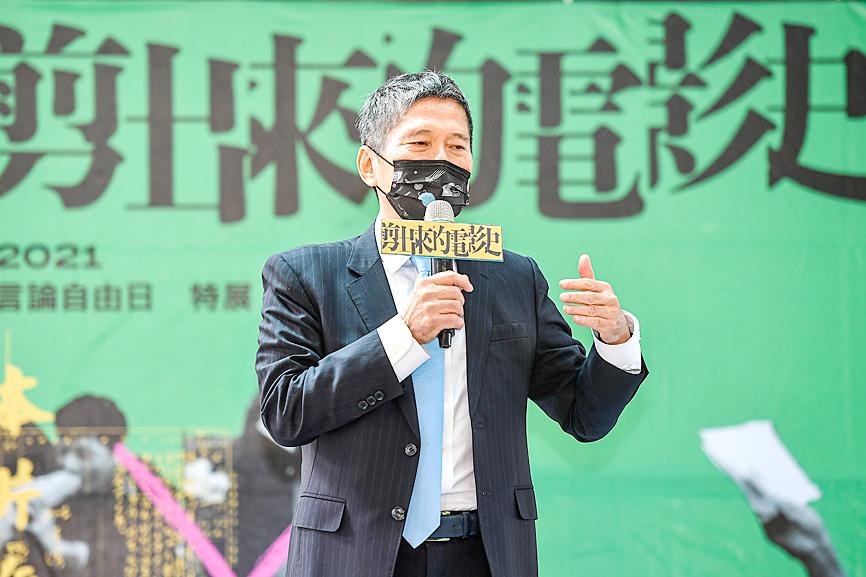A series of lectures, film screenings and discussions are to be held in Taipei through April 25 to mark Freedom of Speech Day, which was yesterday.
The events, which began yesterday, are being organized by the Ministry of the Interior, the Memorial Foundation of 228 and the Nylon Cheng Liberty Foundation.
The series, with the theme of “On the Road to Freedom of Speech,” comprises the “Human Library” lecture series, as well as the Human Rights and Freedom Film Festival and post-screening discussions, the organizers said.

Photo: CNA
From 2pm to 4pm on Saturday, Institute of Watch Internet Network chief executive officer Huang Yi-feng (黃益豐) is to give a lecture on the difference between freedom of speech on the Internet and cyberbullying, as well as regulation and self-discipline within the context of free speech online, they said.
From 3pm to 5pm on Saturday next week, Taiwan FactCheck Center editor-in-chief Summer Chen (陳慧敏) is to give a lecture exploring the purpose of the dissemination of false news, and how to identify such reports, the organizers said.
From 2pm to 4pm on April 24, Ou Su-ying (歐素瑛), a history professor at National Taiwan University, is to give a lecture discussing freedom of speech on school campuses, they said.
Screenings of South Korean director Kim Ui-seok’s debut feature After My Death, Oscar-nominated The Post by director Steven Spielberg, and the 2018 thriller Searching by director Aneesh Chaganty are to begin at 2pm on Sunday, on April 18 and on April 25 respectively, the organizers said.
The screenings are to be followed by discussions led by counseling psychologist Lin Chen-yi (林甄儀), Plain Law Movement senior editor Wang Ting-yu (王鼎棫) and UN Office of Information and Communications Technology consultant Jack Huang (黃一展) respectively, they added.
The events are to be held at the National 228 Memorial Museum in Zhongzheng District (中正), the organizers said.
April 7 was declared Freedom of Speech Day by the Executive Yuan in December 2016 to commemorate the death of democracy activist Deng Nan-jung (鄭南榕, also known as Nylon Cheng).
Deng, who founded the magazine Freedom Era Weekly in 1984 to fight for “100 percent freedom of speech,” died by self-immolation on April 7, 1989, as police broke into his office after he had been barricaded inside for 71 days to avoid arrest after he was charged with sedition for having printed a draft “Republic of Taiwan constitution” in 1988.
Taiwan’s path to achieving freedom of speech has been a “bumpy” one, Minister of the Interior Hsu Kuo-yung (徐國勇) said yesterday at the series’ opening ceremony at the museum, adding that it took hard work to reach the level of freedom the nation enjoys today.
The nation’s hard-won freedom of speech was made possible due to the sacrifice of individuals like Deng, Hsu said, urging people to defend it with “all our strength.”
More information about the events can be found at www.228.org.tw or www.moi.gov.tw.

‘DENIAL DEFENSE’: The US would increase its military presence with uncrewed ships, and submarines, while boosting defense in the Indo-Pacific, a Pete Hegseth memo said The US is reorienting its military strategy to focus primarily on deterring a potential Chinese invasion of Taiwan, a memo signed by US Secretary of Defense Pete Hegseth showed. The memo also called on Taiwan to increase its defense spending. The document, known as the “Interim National Defense Strategic Guidance,” was distributed this month and detailed the national defense plans of US President Donald Trump’s administration, an article in the Washington Post said on Saturday. It outlines how the US can prepare for a potential war with China and defend itself from threats in the “near abroad,” including Greenland and the Panama

The Chinese Nationalist Party (KMT) is maintaining close ties with Beijing, the Democratic Progressive Party (DPP) said yesterday, hours after a new round of Chinese military drills in the Taiwan Strait began. Political parties in a democracy have a responsibility to be loyal to the nation and defend its sovereignty, DPP spokesman Justin Wu (吳崢) told a news conference in Taipei. His comments came hours after Beijing announced via Chinese state media that the Chinese People’s Liberation Army’s Eastern Theater Command was holding large-scale drills simulating a multi-pronged attack on Taiwan. Contrary to the KMT’s claims that it is staunchly anti-communist, KMT Deputy

RESPONSE: The government would investigate incidents of Taiwanese entertainers in China promoting CCP propaganda online in contravention of the law, the source said Taiwanese entertainers living in China who are found to have contravened cross-strait regulations or collaborated with the Chinese Communist Party (CCP) could be subject to fines, a source said on Sunday. Several Taiwanese entertainers have posted on the social media platform Sina Weibo saying that Taiwan “must be returned” to China, and sharing news articles from Chinese state media. In response, the Mainland Affairs Council (MAC) has asked the Ministry of Culture to investigate whether the entertainers had contravened any laws, and asked for them to be questioned upon their return to Taiwan, an official familiar with the matter said. To curb repeated

Myanmar has turned down an offer of assistance from Taiwanese search-and-rescue teams after a magnitude 7.7 earthquake struck the nation on Friday last week, saying other international aid is sufficient, the National Fire Agency said yesterday. More than 1,700 have been killed and 3,400 injured in the quake that struck near the central Myanmar city of Mandalay early on Friday afternoon, followed minutes later by a magnitude 6.7 aftershock. Worldwide, 13 international search-and-rescue teams have been deployed, with another 13 teams mobilizing, the agency said. Taiwan’s search-and-rescue teams were on standby, but have since been told to stand down, as